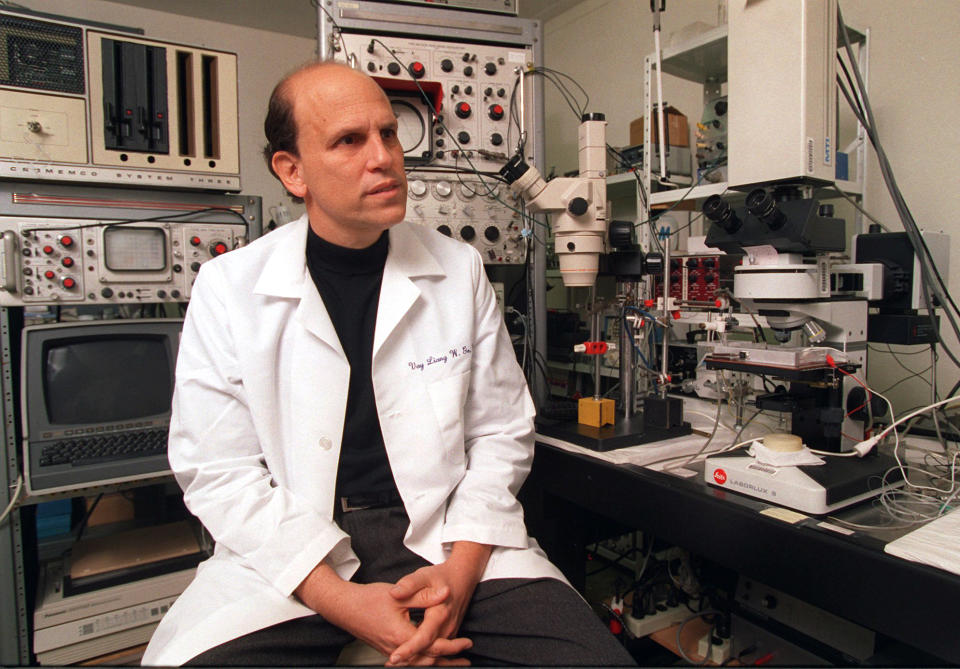George Washington health school named for Milken
WASHINGTON (AP) — George Washington University will name its public health school after an institute founded by Michael Milken, a philanthropist and advocate for medical research, after he helped generate three record-setting gifts totaling $80 million for the school.
The gifts, announced Tuesday, include $40 million from the nonprofit Milken Institute to support research and scholarships and $30 million from the Sumner M. Redstone Charitable Foundation to expand wellness and disease prevention. A $10 million gift from the Milken Family Foundation will support a new scholarship program and dean's endowment.
Milken, known as the king of Wall Street "junk" bonds in the 1980s, pleaded guilty to securities fraud in 1990 and spent 22 months in prison. He has also become a leading philanthropist for public health and an advocate for increased government research funding.
The gifts connected to Milken and Redstone, who is board chairman of Viacom and CBS, will create the Milken Institute School of Public Health and the Sumner M. Redstone Global Center for Prevention and Wellness. This is the largest ever gift for the Santa Monica, Calif.-based Milken Institute, a think tank funded by various donors that usually runs its own programs.
George Washington University President Steven Knapp and School of Public Health Dean Lynn Goldman told The Associated Press they were not worried about any backlash in having the school carry the name of someone with a criminal past.
"We're talking about somebody who over a number of decades has made a difference that's incalculable to the lives of people in this nation and around the world through what he has done, particularly in the fields of medicine and health," Knapp said. "I think he has certainly earned his recognition as the foremost philanthropist focused on addressing the challenges of national and global health."
Goldman said the gift would be transformative for the school as it moves into a new $75 million building next to the university's hospital.
It's a relatively new school of public health that has been growing in recent years with an expanded focus on addressing chronic disease and diseases related to obesity.
"All I can say is that I'm just simply delighted to see philanthropy turning their attention to prevention because I think there's a bigger bang for their buck," Goldman said. "It's about time that people began to recognize that while it's important to develop cures, that it's also important to prevent disease."
Milken once led a march in Washington to increase government funding for the National Institutes of Health and other agencies that eventually resulted in an increase signed into law by President Bill Clinton.
Milken said his interest in public health dates back more than 40 years after seeing his mother-in-law and his father die from cancer, followed by other family members. Despite advances in research, He said the nation's health policies have been still lacking a focus on prevention and wellness.
"As I reflect on the last 40 years, we've actually gone backwards in the public health area, particularly on obesity," Milken said.
Milken, 67, is a prostate cancer survivor who has long been an active philanthropist and advocate for medical research. His career as a cutting-edge financier ended with a prison term. He was known as the king of the high-risk, high-interest "junk" bond in the 1980s and came to symbolize the excesses and greed of Wall Street run amok. In business, Milken pioneered use of the bonds to finance corporate takeover battles and became a dominant force in the 1980s takeover boom.
After his release from prison, Milken has focused full-time on philanthropy. Milken and his family have given hundreds of millions of dollars away in recent decades. Much of it is channeled through the Santa Monica, Calif.-based Milken Family Foundation, founded in 1982, which funds education and medical research, especially in the cancer field.
Philanthropy is "a central mission of my life," Milken said, adding that he takes joy in seeing death rates from certain cancers cut in half. "Personally it's not the giving of the money, it's seeing the results."
Law professor John Banzhaf, who has led public health projects with students, said Milken's name was not familiar to him at first, but he was not concerned about renaming the public health school.
"Quite frankly, I didn't even really think about it," he said. "I would hope and assume that the benefits that will be derived from it will overcome the negatives of it."
But he said he hopes the new money for public health won't all be used for new courses and conferences. Instead, it should be used to take legal action to translate policy into practice, Banzhaf said. He noted the law school recently advocated for a surcharge for smokers under the nation's health care overhaul to help improve public health.
The university board on Monday unanimously approved naming the school and dean's post for the Milken donations and the new center for Redstone, Knapp said. Now the school will be positioned to have an influence on health policy in Washington, he said.
"If we're really going to get a handle on health care costs as a national and global issue," Knapp said, "there's really got to be an important emphasis on prevention and wellness that Michael Milken is now pushing."
___
Associated Press writer Marcy Gordon contributed to this report.
___
Follow Brett Zongker on Twitter at https://twitter.com/DCArtBeat .



